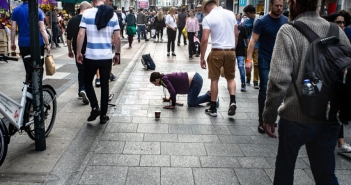The penny drops as I listen to RTE’s Liveline. There’s a highly articulate woman in her fifties, who is renting. Holding out little hope for the future, she pleads with the powers that be to solve the Housing Crisis, in its entirety, no more sticking plasters: “Solve it for everyone,” she stresses, “even if 50,000 houses were built and delivered next year, I could not afford one.”
This leads to the following questions: first, assuming she has a regular wage, why can’t she affort to own a home as her parents and grandparents before her would have expected? And secondly, is the housing market really broken, or is that our financing market is broken?
Now let’s consider how we view the family homes market. Should we treat these as assets that appreciate in value and make us rich at the end of our lives, or something else?
Why should we become economically confident when house prices rise? If we have more than one child, and we want them to own their own house, any increase in the value of our homes will be lost when they come to buy; our gain is their loss.
Whenever a wealth manager – the financial advisor to a rich sophisticated investor – records a family’s net worth, they exclude the family home. This is because it is not a tradeable asset; it cannot be realised for alternative investments; it’s where a person lives and any investment strategy should not put that at risk; a roof over one’s head is a basic requirement after all.
"The Vultures know exactly what they want. But we don’t. So we end up being picked off." Ben Hoey explains what is causing Ireland's Housing Crisis.https://t.co/XbQ3mK1j5u@broadsheet_ie @BowesChay @paddycosgrave @williamhboney1 @caulmick @TomLyonsBiz @RoryHearne #HousingCrisis
— CassandraVoices (@VoicesCassandra) September 18, 2021
If we are to have any chance of solving this crisis of housing insecurity for a growing number of our fellow citizens, then we must accept that family homes are not investments, not a substitute for a pension. In any case with rising life expectancy and care needs growing, it’s an asset many of us won’t be in a position to leave to our children.
It’s time to accept that family homes provide accommodation for the workers of this State. These are taxpayers who support the retired civil servants, and many other pensioners besides. It is vital that their cost of living is kept sufficiently low to ensure a decent quality of life, which ultimately underpins the productivity of labour in the State, and maintains the global competitiveness of our economy.
We need to return to how we treated family homes in the 1970s and 1980s. This is not to suggest that councils building homes is the only solution we have. But we should return to the idea that homes are not, and never should be, treated as investments.
The land question has haunted Irish politics since time immemorial. Frank Armstrong attributes the current acute housing crisis to the colonial settlement.https://t.co/7Qp4K5wQrr@broadsheet_ie @BowesChay @vincentbrowne @connolly16frank @caulmick @RoryHearne @fallon_donal
— CassandraVoices (@VoicesCassandra) August 17, 2021
Now ask yourself the question: how come our children and our fellow citizens cannot afford to purchase a home, but can service the commercial rent on the very same property?
Let’s be clear, we don’t need to ‘fix’ the housing crisis or ‘deliver’ affordable homes. We need to ensure that each tax paying citizen of this country has the basic security of a home. In order to do this they must be able to access financing that will put them on a par with Vulture Funds, thereby allowing them to compete for this scarce commodity.
Any solution must eliminate the inequality and injustice in such a way as to deliver home financing to our citizens. We therefore need to create a structure that can deliver competitive finance to all our taxpayers.
If foreign investors can borrow from the banks at 1.2% and first time buyers borrow at 3.99%, who do you think will be in a better position to purchase any houses and apartments that come on to the market?
Let me pose another question: why has the Central Bank of Ireland placed restrictions on our citizens, when buying a home, but placed no similar restrictions on commercial operators in the same market? This is grossly unfair. It is not a financial level playing field.
If you are going to interfere in the market, interfere in such a way that it affects all parties. Put another way: why would you put your savings in the local Irish bank at a return of 0% when your kids borrow from that very same bank to buy their home at 3.99%?
As things stand, I predict that there will be very few new housing developments delivered for sale directly to individuals over the next decade. Let me explain why I believe this.
When a developer purchases a property he obtains planning permission, then seeks finance. In Ireland we only have two commercial banks operating on any scale, and both have been severely hurt by developers in the past and now have tightened lending limits on exposures to this sector.
Frank Armstrong explores the historical origins of capitalism, as the steady financialisation of property threatens the good life we have a right to expect.https://t.co/Lq7z4PeWCP@broadsheet_ie @BowesChay @liamherrick @williamhboney1 @KevinHIpoet1967 @VillageMagIRE @RoryHearne
— CassandraVoices (@VoicesCassandra) September 15, 2021
So the rational developer turns to international investors to finance a project. These international lenders are very cautious people, they don’t lend unless they are almost 100% sure they will be repaid in full; they don’t take punts. They also insist that the developer seeks out pre-sales. Pre-sales occur when the developer sells the entire complex or a significant element to an investment fund before it is built, thus eliminating the risk of the economy tanking, banks restricting their lending to individuals, a recession, a global pandemic, etc.
So, hardly any properties are delivered for individuals to purchase. Small builders cannot access this market, it’s all sown up.
This means that the generation growing up faces renting for the duration of their lives, and accumulating worries into their retirement years. This occurs even, sadly, when they could actually afford that property if there was a level financial playing field. I ask you: is this the kind of community you want to live in?
There is a sinister explanation for why certain individuals might not want to define and solve the problem of property ownership. The more fair a system is, the less profit exists for existing home owners.
Thus, there is an enormous conflict of interest right across the spectrum of those charged with this significant societal responsibility.
Now we, the home owners, all need to ask ourselves, are we willing to give up the vast paper wealth that accumulates over time from owning a home. Or at the very least, can we share it?
The airwaves are full of property experts, everyone has a view. But property is not just an asset, and no one ever talks about the financial aspects, and how we can improve access to finance.
As livelihoods decline in the wake of the pandemic, David Langwallner argues that courts must now vindicate a right to housing and other basic requirements.https://t.co/D0m1oIRoqG@broadsheet_ie @BowesChay @KevinHIpoet1967 @RoryHearne @caulmick @williamhboney1 #HousingCrisis
— CassandraVoices (@VoicesCassandra) September 21, 2021
The international investors are not primarily property experts, they are financial experts and investment bankers. The Irish experts talk about vacant property development, Cuckoos, affordable housing, discounts to market rent, homes over the shop, etc. etc. But all the Vultures know, is the value of money, and how they can deploy it effectively. Unfortunately the Irish public has not developed this financial literacy, meaning the institutions will win every single time, until, that is, we wake up and understand the problem.
In essence, we need to create a co-operative housing body which can access finance on the same basis as the Vultures, and thereby deliver inexpensive money to all tax payers without risking taxpayer’s money. This is possible without breaching EU State Aid rules, without upsetting the banks, but it will rightly piss off international profiteers.
Featured Image: Daniele Idini




